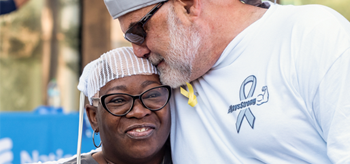NBTS’s QoL Research Grants
In addition to guiding the field to fill the critical gaps in quality of life research for the brain tumor community, the agenda has also inspired the launch of the first NBTS Quality of Life Research Grant, which establishes a scalable grant-making structure to issue awards to qualified researchers.
NBTS announced the first two QoL Research Grants in early 2025, with support in part from Stachestrong.
Current Grants
Ashlee R. Loughan, PhD, and Sarah Ellen Braun, PhD, Virginia Commonwealth University (VCU)
Drs. Loughan and Braun will study the effects of a newly-developed intervention, FearLess in Neuro-Oncology, aimed at reducing fear of recurrence or progression in patients with brain tumors and their caregivers.
Together, Drs. Loughan and Braun have developed an intervention, calledFearLess in Neuro-Oncology, an extensive manual – developed with the input of clinician, patient, and caregiver stakeholders – to address the distress many experience related to the fear of their brain tumor coming back or growing. Dr. Braun has found that this fear is particularly high in both patients with primary malignant brain tumors and their caregivers, across the disease trajectory, and is associated with both individual and partner distress, among other negative outcomes.
With their NBTS Quality of Life Research grant, Drs. Loughan and Braun will conduct a trial enrolling 16 sets of adult brain tumor patients with their primary, informal caregivers. These 16 sets will be randomly split into two groups. The first group will participate in FearLess immediately. The other half will serve as the control group during a waiting period and will receive FearLess after the first group has finished. The researchers will assess the feasibility of recruiting, enrolling, and collecting the data to determine if the FearLess intervention can reduce fear and improve coping.
*If you’re interested in participating in the FearLess in Neuro-Oncology trial, Drs. Loughan and Braun are seeking patients and/or caregivers to participate either individually, or as a dyad. Compensation is available. If you are interested in participating, call or email to see if you are eligible: (804) 628-6799 or livenow@vcu.edu.
Laurie Minns, PhD, University of North Carolina Wilmington (UNCW)
Dr. Minns seeks to provide resources to caregivers of people with brain tumors by adapting the broad PATH© (Preparedness Assessment for the Transition Home) tool specifically for caring for patients with high-grade brain tumors.
With her NBTS Quality of Life Research grant, Dr. Minns will work with Drs. Barbara J. Lutz and Hayley Estrem of the UNCW School of Nursing, along with advisory board members from other research institutions and GBM support groups. Dr. Lutz collaborated with Dr. Michelle Camicia to develop the original PATH instrument, which the team will now seek to adapt specifically for the brain tumor community. PATH was originally created as a readiness assessment for stroke caregivers that screens for an individual’s capacity, commitment, and resources to take on the challenges of caregiving for difficult diseases in the home. Dr. Minns and her team will now work with caregivers of patients with high-grade brain tumors to develop new questions and assessments specific to caring for this population.
*If you’re interested in participating in the PATH-BT study, Dr. Minns is seeking caregivers of patients with high-grade glioma for recruitment. Interested caregivers can share their information with the team, here.


